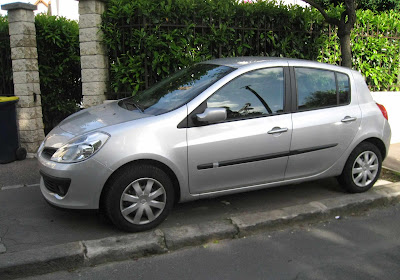
A recent column by economist Dean Baker begins with this paragraph:
“The media coverage of the auto bailouts has focused on the need for union autoworkers to take big pay cuts, causing them to once again miss the real story. The Fiat-Chrysler deal shows that the pay problem is at the top, not the bottom. At the end of the day, the new Chrysler is still likely to be producing most of its cars in the United States. What the new company will be getting from abroad is technology and top management.”
Technology and top management from abroad?
Well, we are nearing the end of a month’s travel in France, driving around in a small but adequate-for-our-purposes Renault Clio, a model that has been manufactured in France since 1990 with incremental technological improvements even though its outward appearance changes little. Ours was brand new from the factory, reserved over the internet directly from the Renault company under their “purchase/repurchase” plan for anyone with a foreign address (Peugeot also has such a plan). This plan commits the vehicle to be exported, with French tax advantages which the company shares with the foreign-based purchaser – who is not really committed to keep the car. So when we turn it in at their compound near the airport, there will be no further cost to us than what we paid up front, about $1,300 – which included unlimited driving miles and all necessary insurance (so it wouldn’t cost us any more even if we total the car). If the car has no damage more than a few repairable dents it will be exported as a used car.
Clios are sold with wide variety of engines, although the purchase/repurchase plan gave fewer options. Since we are inclined to tradeoff a bit of fuel economy for horse power, our first choice was the 1.6 L, 110 hp (0 to 62 mi/h: 10.2 s) gasoline engine, but being as this model was then sold out at the time, we selected the 1.5 L, 85 hp (0 to 62 mi/h: 12.7 s) diesel over the 1.5 L, 67 hp diesel. We found this diesel’s high torque at low rpm to give excellent acceleration, which together with the 5-speed manual transmission made it quite competitive with higher-hp gasoline powered cars at lower speeds. We drove our Clio hard for a total of 1860 miles up to and sometimes exceeding the speed limit of 130 km/hr (81 mi/hr) on the Autoroutes and as slow as the average 12 mi/h in 40 miles of Paris rush-hour driving I did yesterday, for an average “gas” mileage of 44.8 mpg (which surely would have been in the range of closer to 55 mpg with the 67-hp model).
Diesel fuel costs only slightly less than gasoline in France, coming in at about $5/gal. The United States is one of the few countries in the world to sell gasoline as cheaply as they do. This surreal era of cheap gas for Americans will end when the dollar finally crashes and the price of crude oil (in Euros) begins to rise again. They will be able to face this situation better if the U.S. imports automotive “technology and top management” from abroad.
PS On Thursday morning, May 21st, we drove the car pictured above from our friend's home in the Paris suburbs out to Aeroport de Paris - Roissy Charles De Gaulle. Upon pulling up at the Renault/Peugeot export agency lot, it took all of 5 minutes to sign the nessessary papers and see our bags transfered to a small van by the driver who would deposit us in front our departure hall only minutes later.

1 comment:
Hybrids are a good stop gap, I would prefer to see a mass rollout of fully electric cars.
Post a Comment